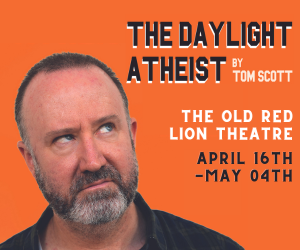The Sex Workers' Opera rehearses on the third floor of Theatre Delicatessen, a multi-level studio space and gutted workplace that used to serve as an office-complex for The Guardian. It's here that the show's creators, Alex Etchart and Siobhan Knox, and co-director Clare Quinn, talk me through the 'impossible task' they set themselves: to put sex workers centre-stage and tear down the misconceptions around their profession. Devised from a series of testimonials, submitted from over sixty sex workers from seventeen countries, Knox and Etchart offer a multi-coloured palette of women's experiences which can't be tarred with the same brush.
People are so shocked that someone who's a sex worker could also be able to sing.
Alex: It's always a journey, trying to balance
representation and voice. Because there's no one type of sex work. Whether in the UK itself or around the world.
And we set ourselves an impossible task, because there's such a diverse range
of sex work and people's experiences, and you can't tell everyone's story.
This is something quite new, right? You never hear these voices in the mainstream media.
Siobhan: I remember when Amnesty International came out in support of decriminalisation [of sex work]. There was so much anger directed at sex workers for just talking about what would keep them safe! And you're getting these people, who aren't sex workers, silencing those who were talking about their own safety and their own rights – people who call themselves feminists but are policing someone else's body.
When it comes to policies, or even talking about sex workers' experiences, the only people who should be doing that is sex workers!
You've made sure at least half of your performers and crew fit that criteria, so they're definitely the ones telling their own story.
Clare: And that applies to the entire technical team as well: our set designer, our mini orchestra, directors, lighting, sound design... For some of them, their family and friends won't even know. So people have managed to get involved behind the scenes, without automatically feeling at risk of outing themselves.
And that's a danger in such a confessional show. But you're also using song and humour to satirise the way sex work is usually talked about.
Clare: We've got loads of jokes in it as well.
Alex: We're clowning the Hollywood stereotypes, because we all know them from the cultural narrative we grew up with. They're embedded in our language, in our films, our music and poetry. We recreate and exaggerate those stories, to try and reveal just how ridiculous some of these stereotypes are, how damaging and dehumanising they are. In a way, they're fantasy, but it's a real depiction of the misrepresentations we experience every day.
You say the show started in a series of workshops for the Royal Opera House. Wasn't this an unusual show for them to take on?
Alex: I was quite surprised, to be honest! But their outreach department was all about trying to include groups that are traditionally excluded. They made a huge effort to make us feel welcome and support us afterwards throughout our production process.
Siobhan: Fundamentally opera is, obviously, an elite institution. That's why it's so striking when you see the words Sex Workers' Opera.
It jumps out at you.
Siobhan: It does! Because opera has represented sex workers for so long –
Alex: Misrepresented.
Siobhan: Exactly! Misrepresented them, painting them as extremely tragic beautiful creatures... This is about a group of sex workers taking over, making clear how they actually want to be represented.
It's about time opera gets a makeover.
Siobhan: Yes! People are so shocked by the idea that someone who's a sex worker could also be able to sing.
Alex: Opera should be modern. It should be engaging. It takes 40% of the Arts Council's funding and gets 15% of its audience. There's a huge disparity between what we think should be supported and funded, and what people actually want to see.
Hopefully it'll reach people who didn't think opera could be relevant to them.
Alex: We're new to opera. This project introduced us to it.
Anon: A number of us are involved in activism around legislation, around community support – but we need cultural production to really get people's attention. We need to make something that people can actually come to.
Something that makes people question their expectations of both opera and sex work...
Alex. At the heart of it, we're speaking for sex workers who are often in the most marginalised groups in society, who use that form of work to survive under difficult circumstances. Not always, of course, as some people do it as a vocation and enjoy it and that's it.
But being respected within making those choices and doing that kind of work – that's all part of the same cultural strand of subverting ivory towers and questioning who is allowed to make opera, when can you call something an opera, and who can use it to tell a good story.
After their sell-out run at the Arcola Theatre, Sex Workers' Opera are moving to the Pleasance Theatre, Islington for a two-week run, 17th - 29th May. Performances are 7.30pm Tuesday – Sunday, with matinees on the 22nd and 28th of May.
www.sexworkersopera.com
www.pleasance.co.uk/event/sex-workers-opera










